Financial Performance Management Report: Analysis and Insights
VerifiedAdded on 2023/01/04
|11
|3607
|77
Report
AI Summary
This report delves into financial performance management, exploring environmental accounting, decision-making processes, and planning tools. Part 1 examines obstacles companies face in controlling environmental impacts and defines reporting approaches, emphasizing the importance of environmental cost analysis and cost-benefit factors. Part 2 focuses on the significance of decision-making, the information management accountants need, and the role of planning tools like capital budgeting and zero-based budgeting in solving financial problems. The report highlights the importance of effective decision-making, the sources of information available to management accountants, and the relevance of budgetary control and KPIs in driving financial performance and achieving organizational goals. The report emphasizes the need for skilled workers to analyze environmental costs and the importance of environmental cost control for businesses operating in the market.

Financial Performance
Management
Management
Paraphrase This Document
Need a fresh take? Get an instant paraphrase of this document with our AI Paraphraser

Table of Contents
INTRODUCTION...........................................................................................................................3
PART1.............................................................................................................................................3
PART 2............................................................................................................................................5
REFERENCES..............................................................................................................................11
INTRODUCTION...........................................................................................................................3
PART1.............................................................................................................................................3
PART 2............................................................................................................................................5
REFERENCES..............................................................................................................................11
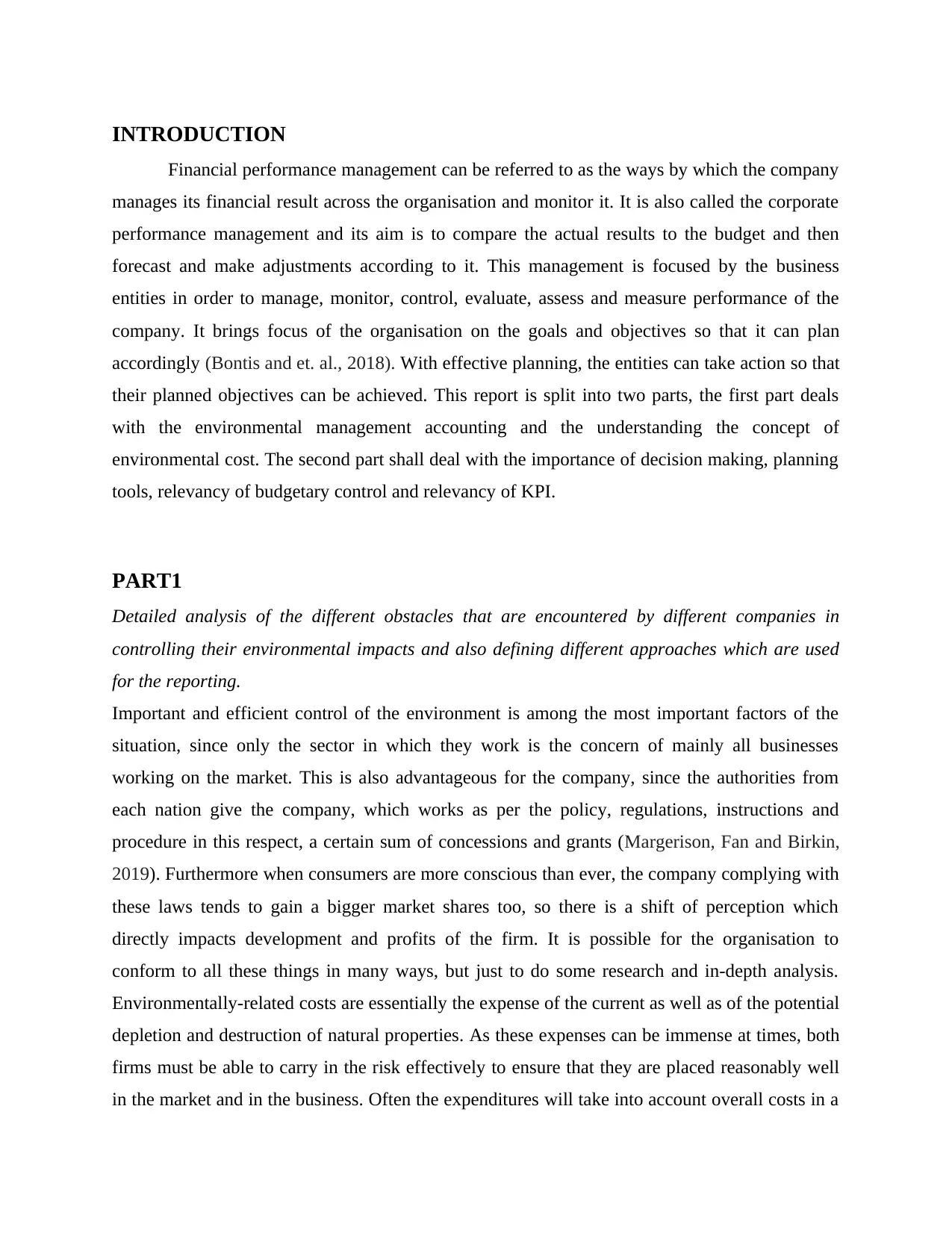
INTRODUCTION
Financial performance management can be referred to as the ways by which the company
manages its financial result across the organisation and monitor it. It is also called the corporate
performance management and its aim is to compare the actual results to the budget and then
forecast and make adjustments according to it. This management is focused by the business
entities in order to manage, monitor, control, evaluate, assess and measure performance of the
company. It brings focus of the organisation on the goals and objectives so that it can plan
accordingly (Bontis and et. al., 2018). With effective planning, the entities can take action so that
their planned objectives can be achieved. This report is split into two parts, the first part deals
with the environmental management accounting and the understanding the concept of
environmental cost. The second part shall deal with the importance of decision making, planning
tools, relevancy of budgetary control and relevancy of KPI.
PART1
Detailed analysis of the different obstacles that are encountered by different companies in
controlling their environmental impacts and also defining different approaches which are used
for the reporting.
Important and efficient control of the environment is among the most important factors of the
situation, since only the sector in which they work is the concern of mainly all businesses
working on the market. This is also advantageous for the company, since the authorities from
each nation give the company, which works as per the policy, regulations, instructions and
procedure in this respect, a certain sum of concessions and grants (Margerison, Fan and Birkin,
2019). Furthermore when consumers are more conscious than ever, the company complying with
these laws tends to gain a bigger market shares too, so there is a shift of perception which
directly impacts development and profits of the firm. It is possible for the organisation to
conform to all these things in many ways, but just to do some research and in-depth analysis.
Environmentally-related costs are essentially the expense of the current as well as of the potential
depletion and destruction of natural properties. As these expenses can be immense at times, both
firms must be able to carry in the risk effectively to ensure that they are placed reasonably well
in the market and in the business. Often the expenditures will take into account overall costs in a
Financial performance management can be referred to as the ways by which the company
manages its financial result across the organisation and monitor it. It is also called the corporate
performance management and its aim is to compare the actual results to the budget and then
forecast and make adjustments according to it. This management is focused by the business
entities in order to manage, monitor, control, evaluate, assess and measure performance of the
company. It brings focus of the organisation on the goals and objectives so that it can plan
accordingly (Bontis and et. al., 2018). With effective planning, the entities can take action so that
their planned objectives can be achieved. This report is split into two parts, the first part deals
with the environmental management accounting and the understanding the concept of
environmental cost. The second part shall deal with the importance of decision making, planning
tools, relevancy of budgetary control and relevancy of KPI.
PART1
Detailed analysis of the different obstacles that are encountered by different companies in
controlling their environmental impacts and also defining different approaches which are used
for the reporting.
Important and efficient control of the environment is among the most important factors of the
situation, since only the sector in which they work is the concern of mainly all businesses
working on the market. This is also advantageous for the company, since the authorities from
each nation give the company, which works as per the policy, regulations, instructions and
procedure in this respect, a certain sum of concessions and grants (Margerison, Fan and Birkin,
2019). Furthermore when consumers are more conscious than ever, the company complying with
these laws tends to gain a bigger market shares too, so there is a shift of perception which
directly impacts development and profits of the firm. It is possible for the organisation to
conform to all these things in many ways, but just to do some research and in-depth analysis.
Environmentally-related costs are essentially the expense of the current as well as of the potential
depletion and destruction of natural properties. As these expenses can be immense at times, both
firms must be able to carry in the risk effectively to ensure that they are placed reasonably well
in the market and in the business. Often the expenditures will take into account overall costs in a
⊘ This is a preview!⊘
Do you want full access?
Subscribe today to unlock all pages.

Trusted by 1+ million students worldwide
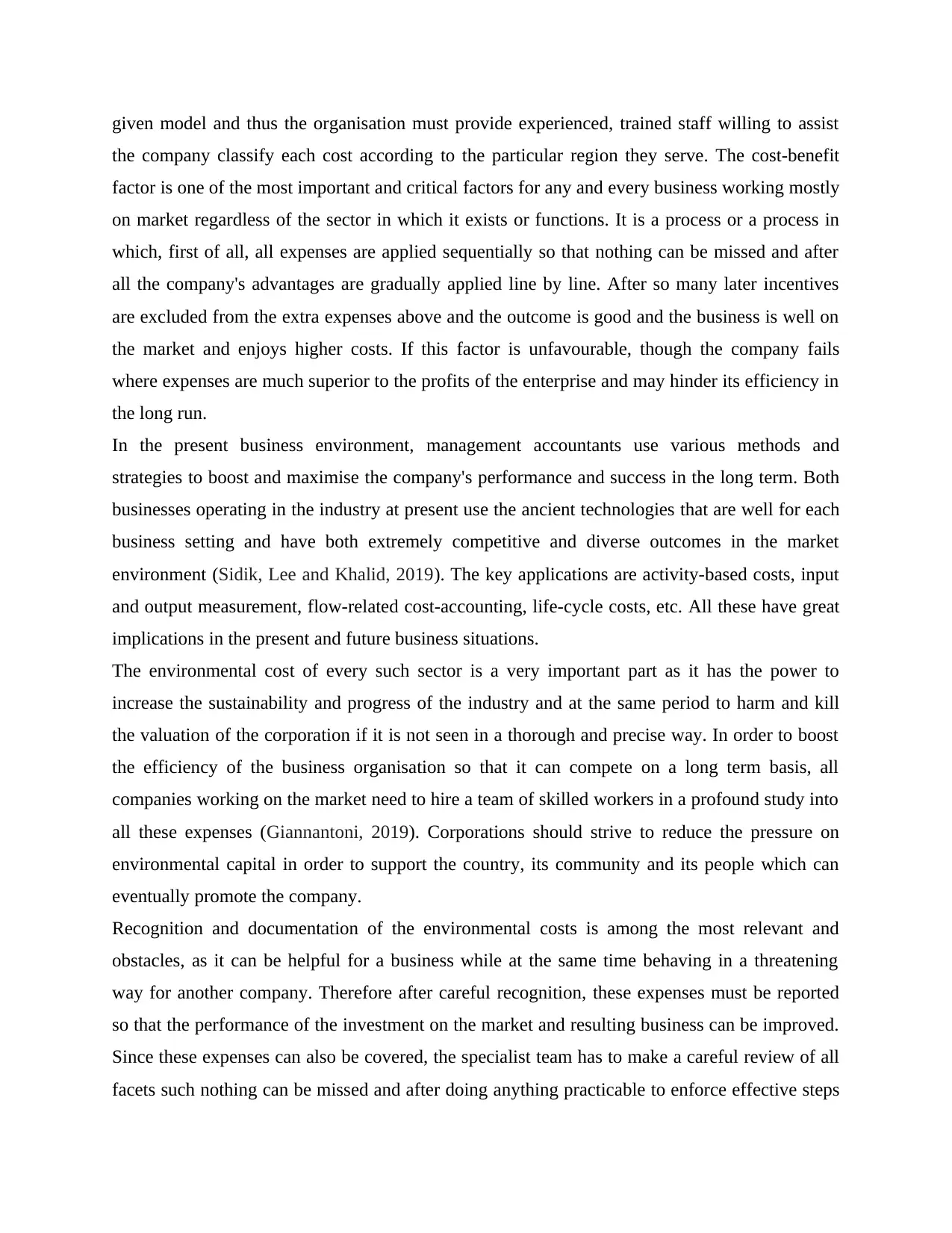
given model and thus the organisation must provide experienced, trained staff willing to assist
the company classify each cost according to the particular region they serve. The cost-benefit
factor is one of the most important and critical factors for any and every business working mostly
on market regardless of the sector in which it exists or functions. It is a process or a process in
which, first of all, all expenses are applied sequentially so that nothing can be missed and after
all the company's advantages are gradually applied line by line. After so many later incentives
are excluded from the extra expenses above and the outcome is good and the business is well on
the market and enjoys higher costs. If this factor is unfavourable, though the company fails
where expenses are much superior to the profits of the enterprise and may hinder its efficiency in
the long run.
In the present business environment, management accountants use various methods and
strategies to boost and maximise the company's performance and success in the long term. Both
businesses operating in the industry at present use the ancient technologies that are well for each
business setting and have both extremely competitive and diverse outcomes in the market
environment (Sidik, Lee and Khalid, 2019). The key applications are activity-based costs, input
and output measurement, flow-related cost-accounting, life-cycle costs, etc. All these have great
implications in the present and future business situations.
The environmental cost of every such sector is a very important part as it has the power to
increase the sustainability and progress of the industry and at the same period to harm and kill
the valuation of the corporation if it is not seen in a thorough and precise way. In order to boost
the efficiency of the business organisation so that it can compete on a long term basis, all
companies working on the market need to hire a team of skilled workers in a profound study into
all these expenses (Giannantoni, 2019). Corporations should strive to reduce the pressure on
environmental capital in order to support the country, its community and its people which can
eventually promote the company.
Recognition and documentation of the environmental costs is among the most relevant and
obstacles, as it can be helpful for a business while at the same time behaving in a threatening
way for another company. Therefore after careful recognition, these expenses must be reported
so that the performance of the investment on the market and resulting business can be improved.
Since these expenses can also be covered, the specialist team has to make a careful review of all
facets such nothing can be missed and after doing anything practicable to enforce effective steps
the company classify each cost according to the particular region they serve. The cost-benefit
factor is one of the most important and critical factors for any and every business working mostly
on market regardless of the sector in which it exists or functions. It is a process or a process in
which, first of all, all expenses are applied sequentially so that nothing can be missed and after
all the company's advantages are gradually applied line by line. After so many later incentives
are excluded from the extra expenses above and the outcome is good and the business is well on
the market and enjoys higher costs. If this factor is unfavourable, though the company fails
where expenses are much superior to the profits of the enterprise and may hinder its efficiency in
the long run.
In the present business environment, management accountants use various methods and
strategies to boost and maximise the company's performance and success in the long term. Both
businesses operating in the industry at present use the ancient technologies that are well for each
business setting and have both extremely competitive and diverse outcomes in the market
environment (Sidik, Lee and Khalid, 2019). The key applications are activity-based costs, input
and output measurement, flow-related cost-accounting, life-cycle costs, etc. All these have great
implications in the present and future business situations.
The environmental cost of every such sector is a very important part as it has the power to
increase the sustainability and progress of the industry and at the same period to harm and kill
the valuation of the corporation if it is not seen in a thorough and precise way. In order to boost
the efficiency of the business organisation so that it can compete on a long term basis, all
companies working on the market need to hire a team of skilled workers in a profound study into
all these expenses (Giannantoni, 2019). Corporations should strive to reduce the pressure on
environmental capital in order to support the country, its community and its people which can
eventually promote the company.
Recognition and documentation of the environmental costs is among the most relevant and
obstacles, as it can be helpful for a business while at the same time behaving in a threatening
way for another company. Therefore after careful recognition, these expenses must be reported
so that the performance of the investment on the market and resulting business can be improved.
Since these expenses can also be covered, the specialist team has to make a careful review of all
facets such nothing can be missed and after doing anything practicable to enforce effective steps
Paraphrase This Document
Need a fresh take? Get an instant paraphrase of this document with our AI Paraphraser
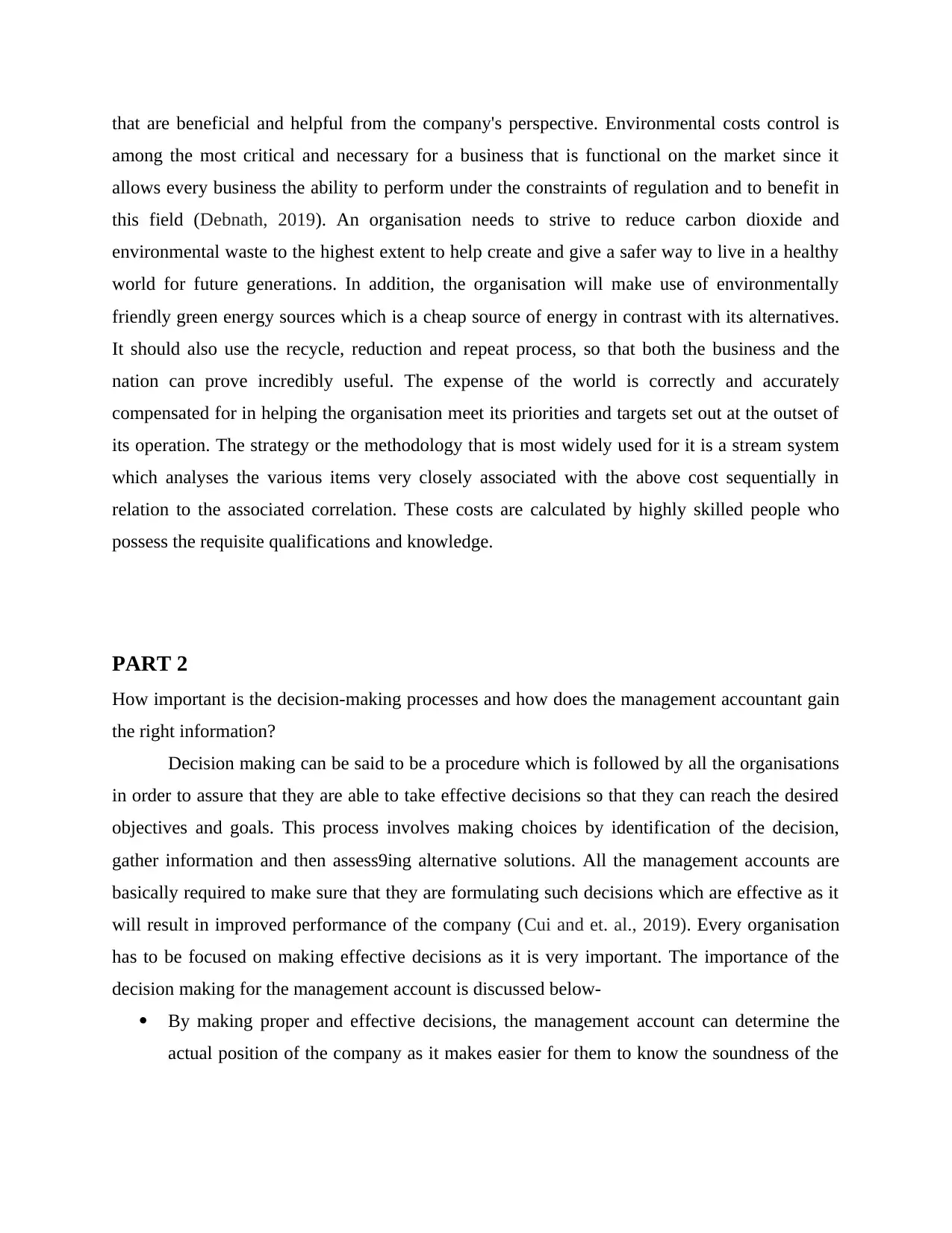
that are beneficial and helpful from the company's perspective. Environmental costs control is
among the most critical and necessary for a business that is functional on the market since it
allows every business the ability to perform under the constraints of regulation and to benefit in
this field (Debnath, 2019). An organisation needs to strive to reduce carbon dioxide and
environmental waste to the highest extent to help create and give a safer way to live in a healthy
world for future generations. In addition, the organisation will make use of environmentally
friendly green energy sources which is a cheap source of energy in contrast with its alternatives.
It should also use the recycle, reduction and repeat process, so that both the business and the
nation can prove incredibly useful. The expense of the world is correctly and accurately
compensated for in helping the organisation meet its priorities and targets set out at the outset of
its operation. The strategy or the methodology that is most widely used for it is a stream system
which analyses the various items very closely associated with the above cost sequentially in
relation to the associated correlation. These costs are calculated by highly skilled people who
possess the requisite qualifications and knowledge.
PART 2
How important is the decision-making processes and how does the management accountant gain
the right information?
Decision making can be said to be a procedure which is followed by all the organisations
in order to assure that they are able to take effective decisions so that they can reach the desired
objectives and goals. This process involves making choices by identification of the decision,
gather information and then assess9ing alternative solutions. All the management accounts are
basically required to make sure that they are formulating such decisions which are effective as it
will result in improved performance of the company (Cui and et. al., 2019). Every organisation
has to be focused on making effective decisions as it is very important. The importance of the
decision making for the management account is discussed below-
By making proper and effective decisions, the management account can determine the
actual position of the company as it makes easier for them to know the soundness of the
among the most critical and necessary for a business that is functional on the market since it
allows every business the ability to perform under the constraints of regulation and to benefit in
this field (Debnath, 2019). An organisation needs to strive to reduce carbon dioxide and
environmental waste to the highest extent to help create and give a safer way to live in a healthy
world for future generations. In addition, the organisation will make use of environmentally
friendly green energy sources which is a cheap source of energy in contrast with its alternatives.
It should also use the recycle, reduction and repeat process, so that both the business and the
nation can prove incredibly useful. The expense of the world is correctly and accurately
compensated for in helping the organisation meet its priorities and targets set out at the outset of
its operation. The strategy or the methodology that is most widely used for it is a stream system
which analyses the various items very closely associated with the above cost sequentially in
relation to the associated correlation. These costs are calculated by highly skilled people who
possess the requisite qualifications and knowledge.
PART 2
How important is the decision-making processes and how does the management accountant gain
the right information?
Decision making can be said to be a procedure which is followed by all the organisations
in order to assure that they are able to take effective decisions so that they can reach the desired
objectives and goals. This process involves making choices by identification of the decision,
gather information and then assess9ing alternative solutions. All the management accounts are
basically required to make sure that they are formulating such decisions which are effective as it
will result in improved performance of the company (Cui and et. al., 2019). Every organisation
has to be focused on making effective decisions as it is very important. The importance of the
decision making for the management account is discussed below-
By making proper and effective decisions, the management account can determine the
actual position of the company as it makes easier for them to know the soundness of the
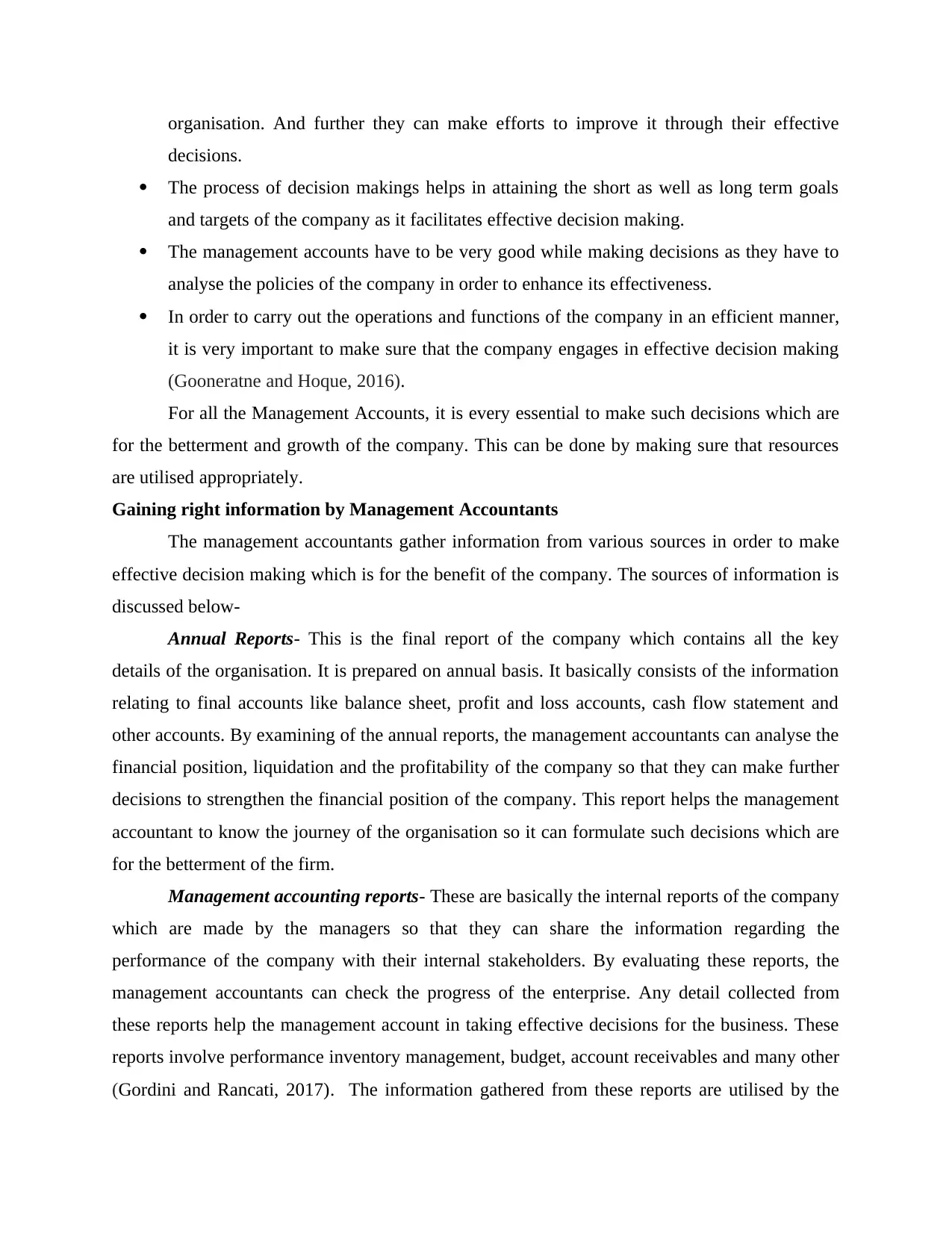
organisation. And further they can make efforts to improve it through their effective
decisions.
The process of decision makings helps in attaining the short as well as long term goals
and targets of the company as it facilitates effective decision making.
The management accounts have to be very good while making decisions as they have to
analyse the policies of the company in order to enhance its effectiveness.
In order to carry out the operations and functions of the company in an efficient manner,
it is very important to make sure that the company engages in effective decision making
(Gooneratne and Hoque, 2016).
For all the Management Accounts, it is every essential to make such decisions which are
for the betterment and growth of the company. This can be done by making sure that resources
are utilised appropriately.
Gaining right information by Management Accountants
The management accountants gather information from various sources in order to make
effective decision making which is for the benefit of the company. The sources of information is
discussed below-
Annual Reports- This is the final report of the company which contains all the key
details of the organisation. It is prepared on annual basis. It basically consists of the information
relating to final accounts like balance sheet, profit and loss accounts, cash flow statement and
other accounts. By examining of the annual reports, the management accountants can analyse the
financial position, liquidation and the profitability of the company so that they can make further
decisions to strengthen the financial position of the company. This report helps the management
accountant to know the journey of the organisation so it can formulate such decisions which are
for the betterment of the firm.
Management accounting reports- These are basically the internal reports of the company
which are made by the managers so that they can share the information regarding the
performance of the company with their internal stakeholders. By evaluating these reports, the
management accountants can check the progress of the enterprise. Any detail collected from
these reports help the management account in taking effective decisions for the business. These
reports involve performance inventory management, budget, account receivables and many other
(Gordini and Rancati, 2017). The information gathered from these reports are utilised by the
decisions.
The process of decision makings helps in attaining the short as well as long term goals
and targets of the company as it facilitates effective decision making.
The management accounts have to be very good while making decisions as they have to
analyse the policies of the company in order to enhance its effectiveness.
In order to carry out the operations and functions of the company in an efficient manner,
it is very important to make sure that the company engages in effective decision making
(Gooneratne and Hoque, 2016).
For all the Management Accounts, it is every essential to make such decisions which are
for the betterment and growth of the company. This can be done by making sure that resources
are utilised appropriately.
Gaining right information by Management Accountants
The management accountants gather information from various sources in order to make
effective decision making which is for the benefit of the company. The sources of information is
discussed below-
Annual Reports- This is the final report of the company which contains all the key
details of the organisation. It is prepared on annual basis. It basically consists of the information
relating to final accounts like balance sheet, profit and loss accounts, cash flow statement and
other accounts. By examining of the annual reports, the management accountants can analyse the
financial position, liquidation and the profitability of the company so that they can make further
decisions to strengthen the financial position of the company. This report helps the management
accountant to know the journey of the organisation so it can formulate such decisions which are
for the betterment of the firm.
Management accounting reports- These are basically the internal reports of the company
which are made by the managers so that they can share the information regarding the
performance of the company with their internal stakeholders. By evaluating these reports, the
management accountants can check the progress of the enterprise. Any detail collected from
these reports help the management account in taking effective decisions for the business. These
reports involve performance inventory management, budget, account receivables and many other
(Gordini and Rancati, 2017). The information gathered from these reports are utilised by the
⊘ This is a preview!⊘
Do you want full access?
Subscribe today to unlock all pages.

Trusted by 1+ million students worldwide
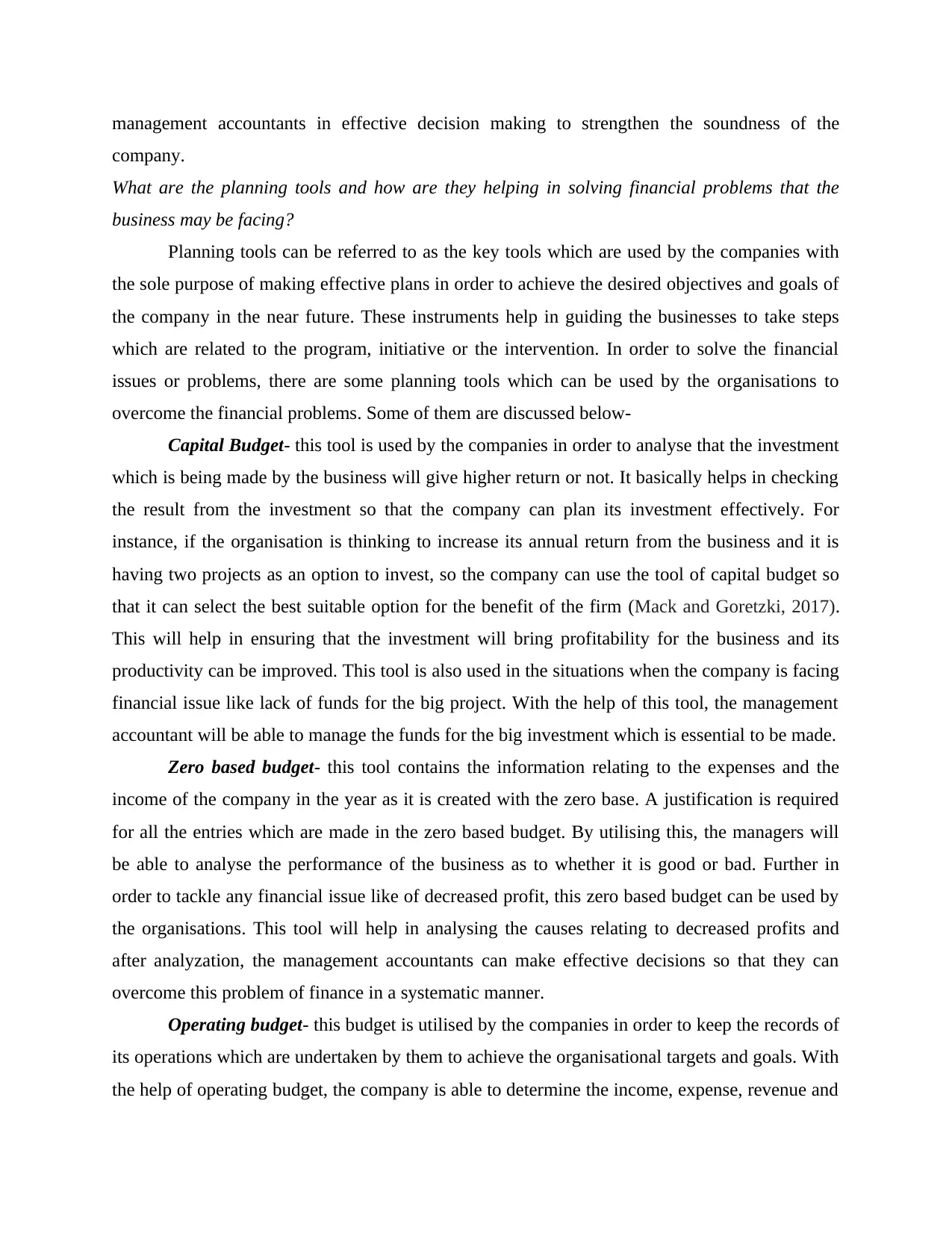
management accountants in effective decision making to strengthen the soundness of the
company.
What are the planning tools and how are they helping in solving financial problems that the
business may be facing?
Planning tools can be referred to as the key tools which are used by the companies with
the sole purpose of making effective plans in order to achieve the desired objectives and goals of
the company in the near future. These instruments help in guiding the businesses to take steps
which are related to the program, initiative or the intervention. In order to solve the financial
issues or problems, there are some planning tools which can be used by the organisations to
overcome the financial problems. Some of them are discussed below-
Capital Budget- this tool is used by the companies in order to analyse that the investment
which is being made by the business will give higher return or not. It basically helps in checking
the result from the investment so that the company can plan its investment effectively. For
instance, if the organisation is thinking to increase its annual return from the business and it is
having two projects as an option to invest, so the company can use the tool of capital budget so
that it can select the best suitable option for the benefit of the firm (Mack and Goretzki, 2017).
This will help in ensuring that the investment will bring profitability for the business and its
productivity can be improved. This tool is also used in the situations when the company is facing
financial issue like lack of funds for the big project. With the help of this tool, the management
accountant will be able to manage the funds for the big investment which is essential to be made.
Zero based budget- this tool contains the information relating to the expenses and the
income of the company in the year as it is created with the zero base. A justification is required
for all the entries which are made in the zero based budget. By utilising this, the managers will
be able to analyse the performance of the business as to whether it is good or bad. Further in
order to tackle any financial issue like of decreased profit, this zero based budget can be used by
the organisations. This tool will help in analysing the causes relating to decreased profits and
after analyzation, the management accountants can make effective decisions so that they can
overcome this problem of finance in a systematic manner.
Operating budget- this budget is utilised by the companies in order to keep the records of
its operations which are undertaken by them to achieve the organisational targets and goals. With
the help of operating budget, the company is able to determine the income, expense, revenue and
company.
What are the planning tools and how are they helping in solving financial problems that the
business may be facing?
Planning tools can be referred to as the key tools which are used by the companies with
the sole purpose of making effective plans in order to achieve the desired objectives and goals of
the company in the near future. These instruments help in guiding the businesses to take steps
which are related to the program, initiative or the intervention. In order to solve the financial
issues or problems, there are some planning tools which can be used by the organisations to
overcome the financial problems. Some of them are discussed below-
Capital Budget- this tool is used by the companies in order to analyse that the investment
which is being made by the business will give higher return or not. It basically helps in checking
the result from the investment so that the company can plan its investment effectively. For
instance, if the organisation is thinking to increase its annual return from the business and it is
having two projects as an option to invest, so the company can use the tool of capital budget so
that it can select the best suitable option for the benefit of the firm (Mack and Goretzki, 2017).
This will help in ensuring that the investment will bring profitability for the business and its
productivity can be improved. This tool is also used in the situations when the company is facing
financial issue like lack of funds for the big project. With the help of this tool, the management
accountant will be able to manage the funds for the big investment which is essential to be made.
Zero based budget- this tool contains the information relating to the expenses and the
income of the company in the year as it is created with the zero base. A justification is required
for all the entries which are made in the zero based budget. By utilising this, the managers will
be able to analyse the performance of the business as to whether it is good or bad. Further in
order to tackle any financial issue like of decreased profit, this zero based budget can be used by
the organisations. This tool will help in analysing the causes relating to decreased profits and
after analyzation, the management accountants can make effective decisions so that they can
overcome this problem of finance in a systematic manner.
Operating budget- this budget is utilised by the companies in order to keep the records of
its operations which are undertaken by them to achieve the organisational targets and goals. With
the help of operating budget, the company is able to determine the income, expense, revenue and
Paraphrase This Document
Need a fresh take? Get an instant paraphrase of this document with our AI Paraphraser
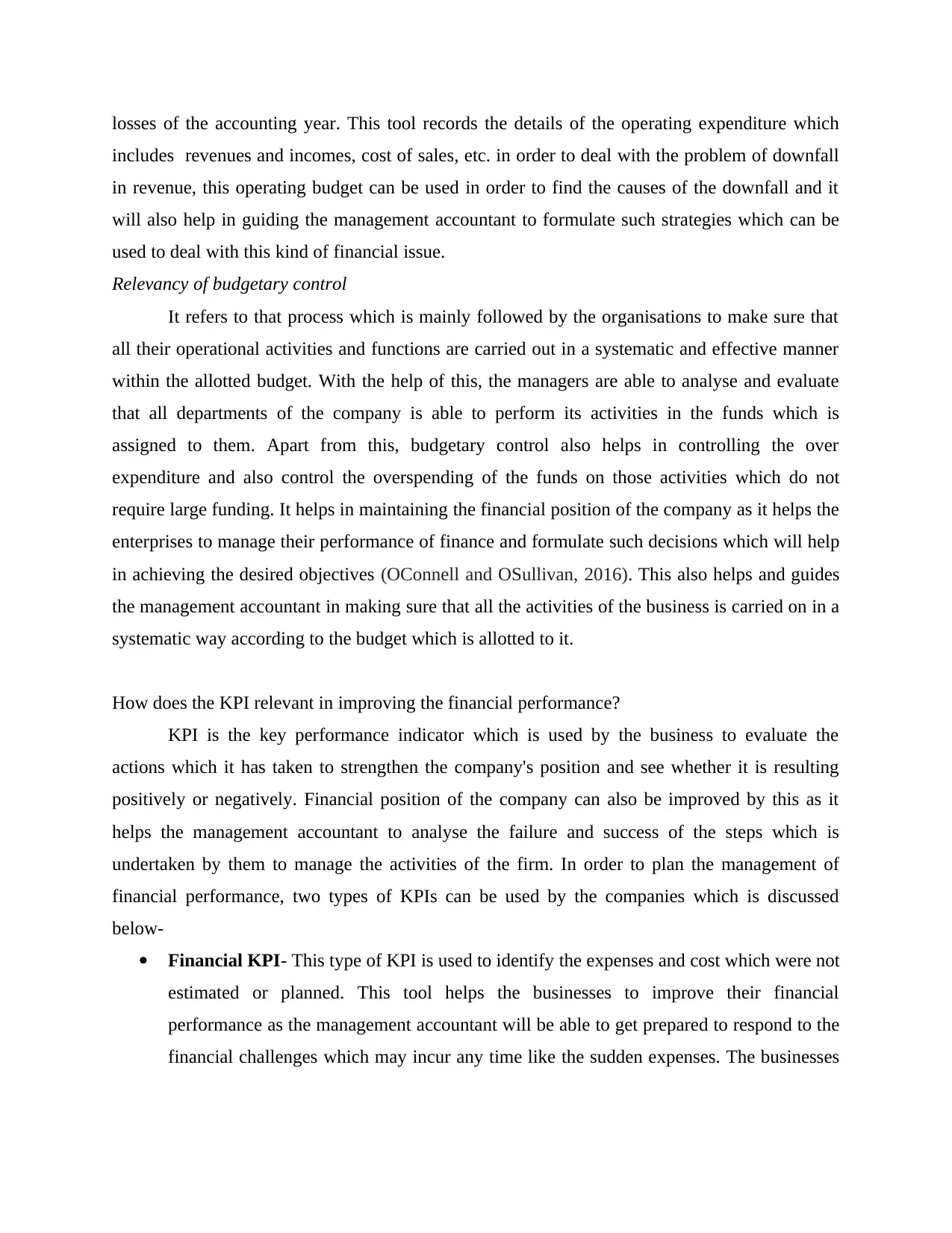
losses of the accounting year. This tool records the details of the operating expenditure which
includes revenues and incomes, cost of sales, etc. in order to deal with the problem of downfall
in revenue, this operating budget can be used in order to find the causes of the downfall and it
will also help in guiding the management accountant to formulate such strategies which can be
used to deal with this kind of financial issue.
Relevancy of budgetary control
It refers to that process which is mainly followed by the organisations to make sure that
all their operational activities and functions are carried out in a systematic and effective manner
within the allotted budget. With the help of this, the managers are able to analyse and evaluate
that all departments of the company is able to perform its activities in the funds which is
assigned to them. Apart from this, budgetary control also helps in controlling the over
expenditure and also control the overspending of the funds on those activities which do not
require large funding. It helps in maintaining the financial position of the company as it helps the
enterprises to manage their performance of finance and formulate such decisions which will help
in achieving the desired objectives (OConnell and OSullivan, 2016). This also helps and guides
the management accountant in making sure that all the activities of the business is carried on in a
systematic way according to the budget which is allotted to it.
How does the KPI relevant in improving the financial performance?
KPI is the key performance indicator which is used by the business to evaluate the
actions which it has taken to strengthen the company's position and see whether it is resulting
positively or negatively. Financial position of the company can also be improved by this as it
helps the management accountant to analyse the failure and success of the steps which is
undertaken by them to manage the activities of the firm. In order to plan the management of
financial performance, two types of KPIs can be used by the companies which is discussed
below-
Financial KPI- This type of KPI is used to identify the expenses and cost which were not
estimated or planned. This tool helps the businesses to improve their financial
performance as the management accountant will be able to get prepared to respond to the
financial challenges which may incur any time like the sudden expenses. The businesses
includes revenues and incomes, cost of sales, etc. in order to deal with the problem of downfall
in revenue, this operating budget can be used in order to find the causes of the downfall and it
will also help in guiding the management accountant to formulate such strategies which can be
used to deal with this kind of financial issue.
Relevancy of budgetary control
It refers to that process which is mainly followed by the organisations to make sure that
all their operational activities and functions are carried out in a systematic and effective manner
within the allotted budget. With the help of this, the managers are able to analyse and evaluate
that all departments of the company is able to perform its activities in the funds which is
assigned to them. Apart from this, budgetary control also helps in controlling the over
expenditure and also control the overspending of the funds on those activities which do not
require large funding. It helps in maintaining the financial position of the company as it helps the
enterprises to manage their performance of finance and formulate such decisions which will help
in achieving the desired objectives (OConnell and OSullivan, 2016). This also helps and guides
the management accountant in making sure that all the activities of the business is carried on in a
systematic way according to the budget which is allotted to it.
How does the KPI relevant in improving the financial performance?
KPI is the key performance indicator which is used by the business to evaluate the
actions which it has taken to strengthen the company's position and see whether it is resulting
positively or negatively. Financial position of the company can also be improved by this as it
helps the management accountant to analyse the failure and success of the steps which is
undertaken by them to manage the activities of the firm. In order to plan the management of
financial performance, two types of KPIs can be used by the companies which is discussed
below-
Financial KPI- This type of KPI is used to identify the expenses and cost which were not
estimated or planned. This tool helps the businesses to improve their financial
performance as the management accountant will be able to get prepared to respond to the
financial challenges which may incur any time like the sudden expenses. The businesses
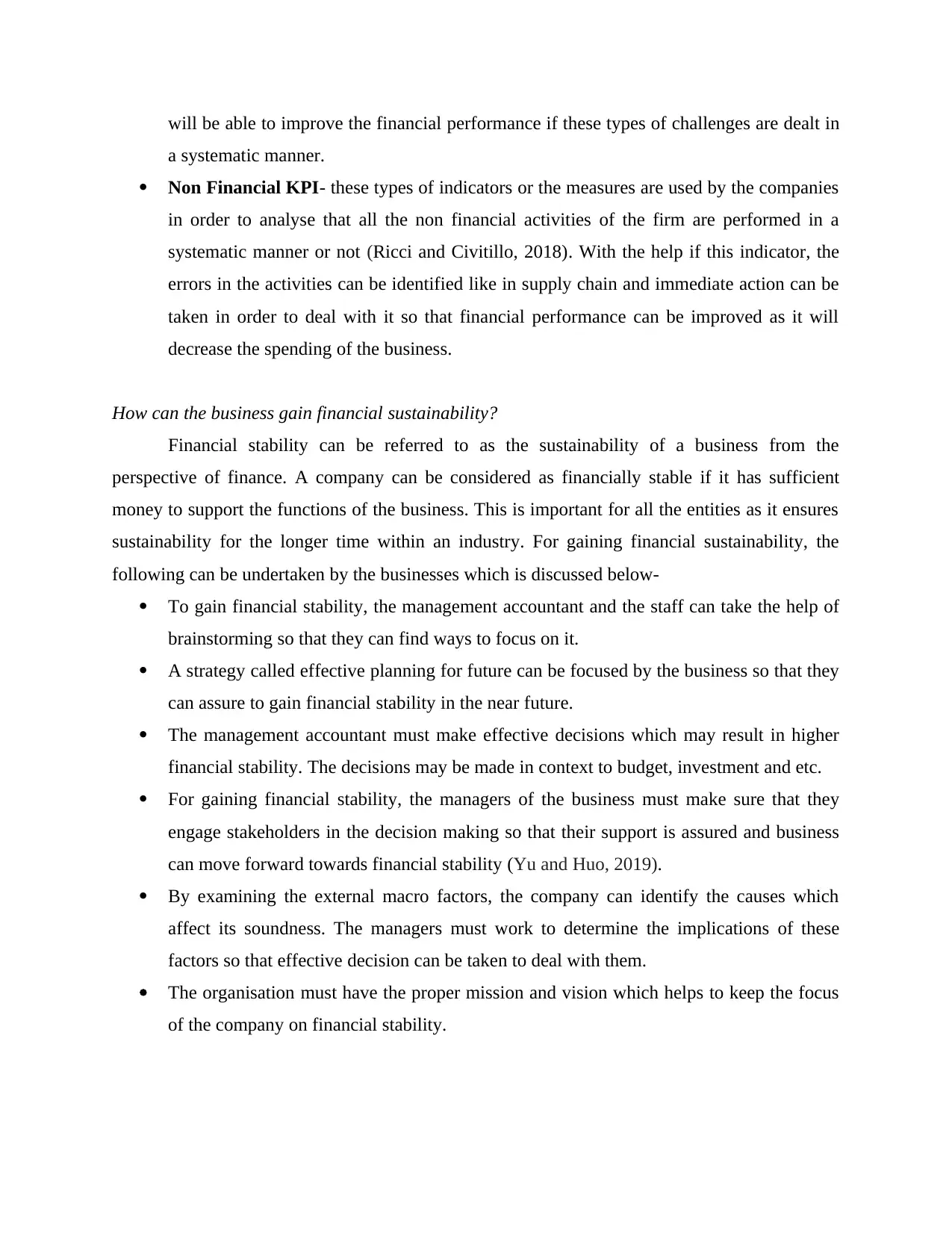
will be able to improve the financial performance if these types of challenges are dealt in
a systematic manner.
Non Financial KPI- these types of indicators or the measures are used by the companies
in order to analyse that all the non financial activities of the firm are performed in a
systematic manner or not (Ricci and Civitillo, 2018). With the help if this indicator, the
errors in the activities can be identified like in supply chain and immediate action can be
taken in order to deal with it so that financial performance can be improved as it will
decrease the spending of the business.
How can the business gain financial sustainability?
Financial stability can be referred to as the sustainability of a business from the
perspective of finance. A company can be considered as financially stable if it has sufficient
money to support the functions of the business. This is important for all the entities as it ensures
sustainability for the longer time within an industry. For gaining financial sustainability, the
following can be undertaken by the businesses which is discussed below-
To gain financial stability, the management accountant and the staff can take the help of
brainstorming so that they can find ways to focus on it.
A strategy called effective planning for future can be focused by the business so that they
can assure to gain financial stability in the near future.
The management accountant must make effective decisions which may result in higher
financial stability. The decisions may be made in context to budget, investment and etc.
For gaining financial stability, the managers of the business must make sure that they
engage stakeholders in the decision making so that their support is assured and business
can move forward towards financial stability (Yu and Huo, 2019).
By examining the external macro factors, the company can identify the causes which
affect its soundness. The managers must work to determine the implications of these
factors so that effective decision can be taken to deal with them.
The organisation must have the proper mission and vision which helps to keep the focus
of the company on financial stability.
a systematic manner.
Non Financial KPI- these types of indicators or the measures are used by the companies
in order to analyse that all the non financial activities of the firm are performed in a
systematic manner or not (Ricci and Civitillo, 2018). With the help if this indicator, the
errors in the activities can be identified like in supply chain and immediate action can be
taken in order to deal with it so that financial performance can be improved as it will
decrease the spending of the business.
How can the business gain financial sustainability?
Financial stability can be referred to as the sustainability of a business from the
perspective of finance. A company can be considered as financially stable if it has sufficient
money to support the functions of the business. This is important for all the entities as it ensures
sustainability for the longer time within an industry. For gaining financial sustainability, the
following can be undertaken by the businesses which is discussed below-
To gain financial stability, the management accountant and the staff can take the help of
brainstorming so that they can find ways to focus on it.
A strategy called effective planning for future can be focused by the business so that they
can assure to gain financial stability in the near future.
The management accountant must make effective decisions which may result in higher
financial stability. The decisions may be made in context to budget, investment and etc.
For gaining financial stability, the managers of the business must make sure that they
engage stakeholders in the decision making so that their support is assured and business
can move forward towards financial stability (Yu and Huo, 2019).
By examining the external macro factors, the company can identify the causes which
affect its soundness. The managers must work to determine the implications of these
factors so that effective decision can be taken to deal with them.
The organisation must have the proper mission and vision which helps to keep the focus
of the company on financial stability.
⊘ This is a preview!⊘
Do you want full access?
Subscribe today to unlock all pages.

Trusted by 1+ million students worldwide
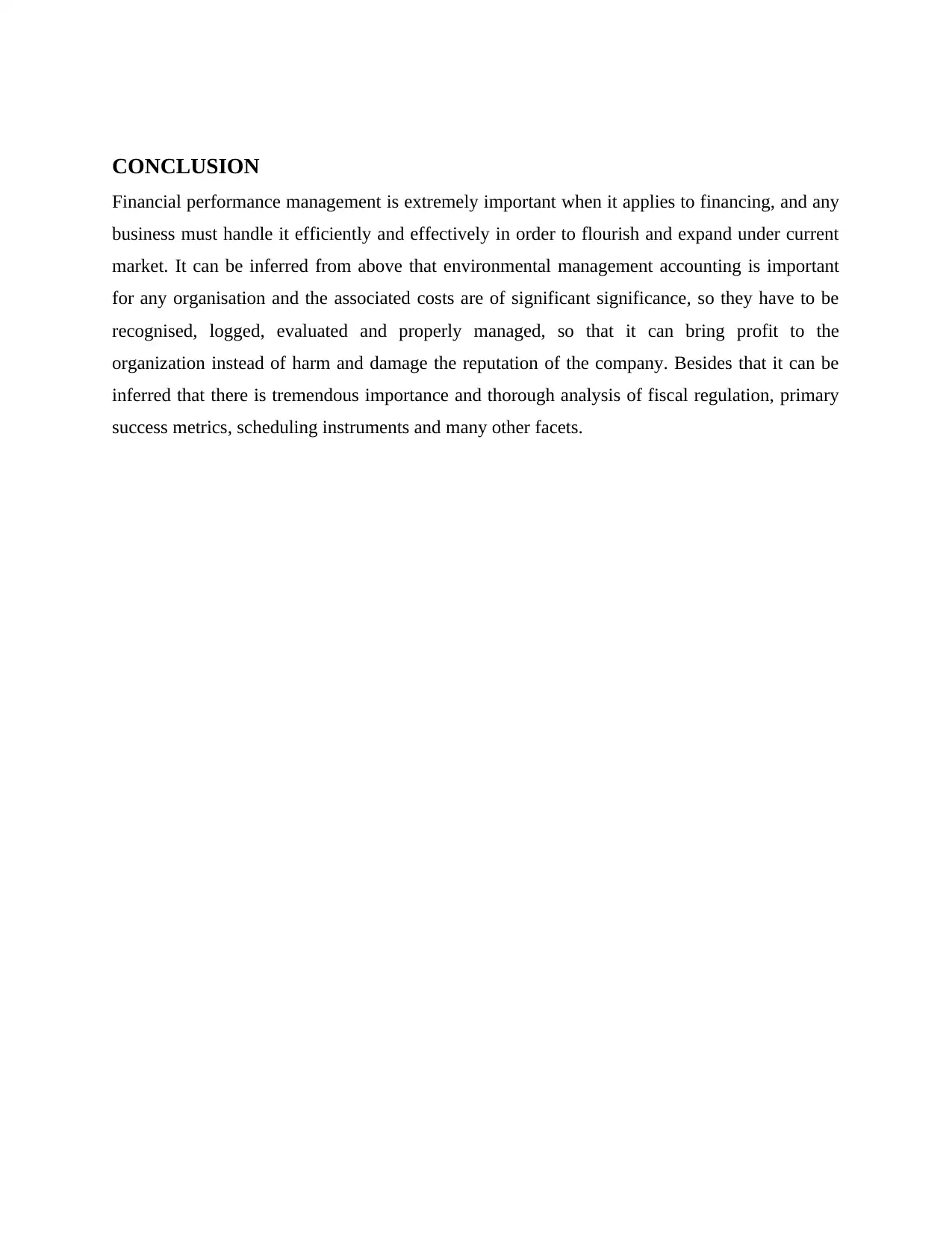
CONCLUSION
Financial performance management is extremely important when it applies to financing, and any
business must handle it efficiently and effectively in order to flourish and expand under current
market. It can be inferred from above that environmental management accounting is important
for any organisation and the associated costs are of significant significance, so they have to be
recognised, logged, evaluated and properly managed, so that it can bring profit to the
organization instead of harm and damage the reputation of the company. Besides that it can be
inferred that there is tremendous importance and thorough analysis of fiscal regulation, primary
success metrics, scheduling instruments and many other facets.
Financial performance management is extremely important when it applies to financing, and any
business must handle it efficiently and effectively in order to flourish and expand under current
market. It can be inferred from above that environmental management accounting is important
for any organisation and the associated costs are of significant significance, so they have to be
recognised, logged, evaluated and properly managed, so that it can bring profit to the
organization instead of harm and damage the reputation of the company. Besides that it can be
inferred that there is tremendous importance and thorough analysis of fiscal regulation, primary
success metrics, scheduling instruments and many other facets.
Paraphrase This Document
Need a fresh take? Get an instant paraphrase of this document with our AI Paraphraser
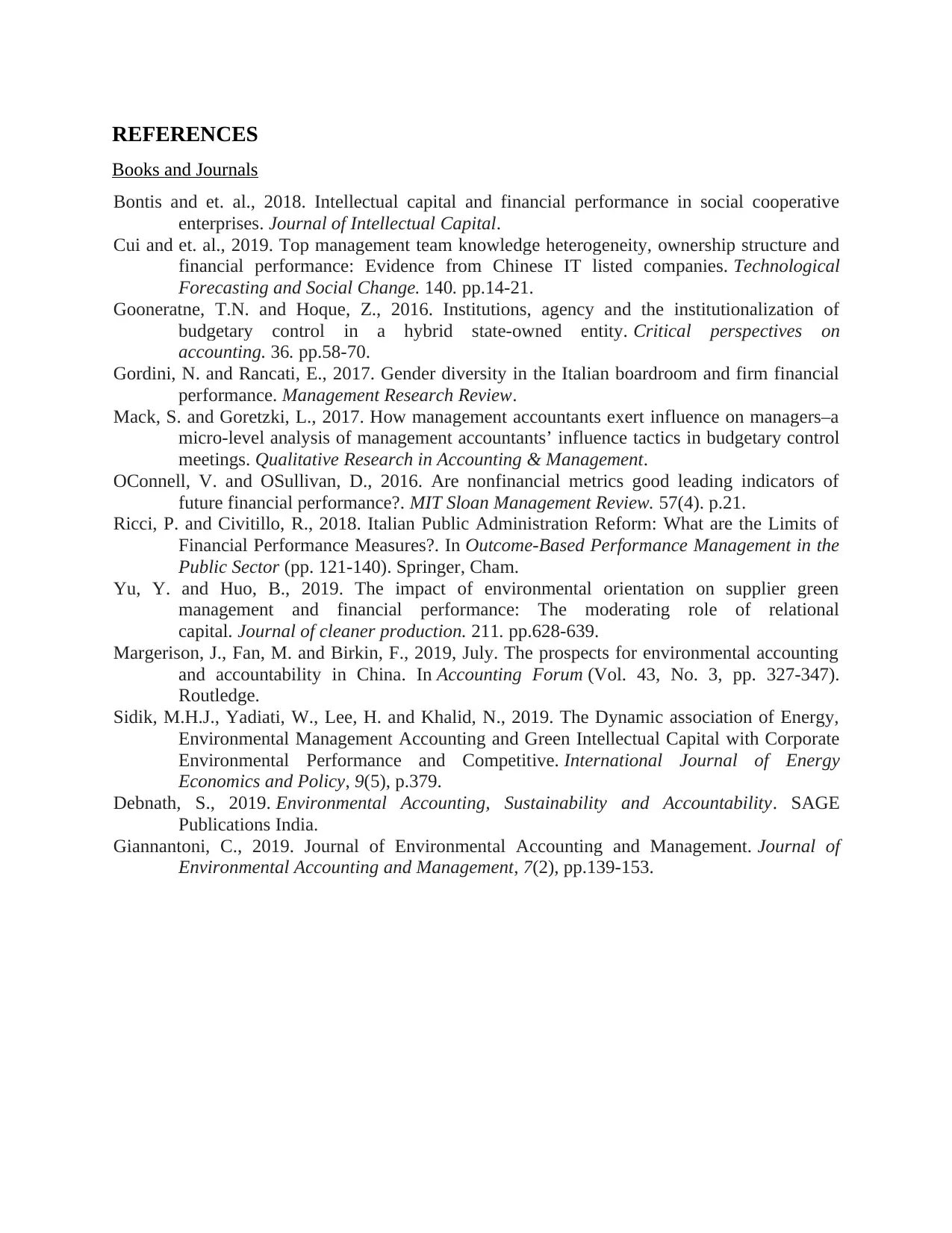
REFERENCES
Books and Journals
Bontis and et. al., 2018. Intellectual capital and financial performance in social cooperative
enterprises. Journal of Intellectual Capital.
Cui and et. al., 2019. Top management team knowledge heterogeneity, ownership structure and
financial performance: Evidence from Chinese IT listed companies. Technological
Forecasting and Social Change. 140. pp.14-21.
Gooneratne, T.N. and Hoque, Z., 2016. Institutions, agency and the institutionalization of
budgetary control in a hybrid state-owned entity. Critical perspectives on
accounting. 36. pp.58-70.
Gordini, N. and Rancati, E., 2017. Gender diversity in the Italian boardroom and firm financial
performance. Management Research Review.
Mack, S. and Goretzki, L., 2017. How management accountants exert influence on managers–a
micro-level analysis of management accountants’ influence tactics in budgetary control
meetings. Qualitative Research in Accounting & Management.
OConnell, V. and OSullivan, D., 2016. Are nonfinancial metrics good leading indicators of
future financial performance?. MIT Sloan Management Review. 57(4). p.21.
Ricci, P. and Civitillo, R., 2018. Italian Public Administration Reform: What are the Limits of
Financial Performance Measures?. In Outcome-Based Performance Management in the
Public Sector (pp. 121-140). Springer, Cham.
Yu, Y. and Huo, B., 2019. The impact of environmental orientation on supplier green
management and financial performance: The moderating role of relational
capital. Journal of cleaner production. 211. pp.628-639.
Margerison, J., Fan, M. and Birkin, F., 2019, July. The prospects for environmental accounting
and accountability in China. In Accounting Forum (Vol. 43, No. 3, pp. 327-347).
Routledge.
Sidik, M.H.J., Yadiati, W., Lee, H. and Khalid, N., 2019. The Dynamic association of Energy,
Environmental Management Accounting and Green Intellectual Capital with Corporate
Environmental Performance and Competitive. International Journal of Energy
Economics and Policy, 9(5), p.379.
Debnath, S., 2019. Environmental Accounting, Sustainability and Accountability. SAGE
Publications India.
Giannantoni, C., 2019. Journal of Environmental Accounting and Management. Journal of
Environmental Accounting and Management, 7(2), pp.139-153.
Books and Journals
Bontis and et. al., 2018. Intellectual capital and financial performance in social cooperative
enterprises. Journal of Intellectual Capital.
Cui and et. al., 2019. Top management team knowledge heterogeneity, ownership structure and
financial performance: Evidence from Chinese IT listed companies. Technological
Forecasting and Social Change. 140. pp.14-21.
Gooneratne, T.N. and Hoque, Z., 2016. Institutions, agency and the institutionalization of
budgetary control in a hybrid state-owned entity. Critical perspectives on
accounting. 36. pp.58-70.
Gordini, N. and Rancati, E., 2017. Gender diversity in the Italian boardroom and firm financial
performance. Management Research Review.
Mack, S. and Goretzki, L., 2017. How management accountants exert influence on managers–a
micro-level analysis of management accountants’ influence tactics in budgetary control
meetings. Qualitative Research in Accounting & Management.
OConnell, V. and OSullivan, D., 2016. Are nonfinancial metrics good leading indicators of
future financial performance?. MIT Sloan Management Review. 57(4). p.21.
Ricci, P. and Civitillo, R., 2018. Italian Public Administration Reform: What are the Limits of
Financial Performance Measures?. In Outcome-Based Performance Management in the
Public Sector (pp. 121-140). Springer, Cham.
Yu, Y. and Huo, B., 2019. The impact of environmental orientation on supplier green
management and financial performance: The moderating role of relational
capital. Journal of cleaner production. 211. pp.628-639.
Margerison, J., Fan, M. and Birkin, F., 2019, July. The prospects for environmental accounting
and accountability in China. In Accounting Forum (Vol. 43, No. 3, pp. 327-347).
Routledge.
Sidik, M.H.J., Yadiati, W., Lee, H. and Khalid, N., 2019. The Dynamic association of Energy,
Environmental Management Accounting and Green Intellectual Capital with Corporate
Environmental Performance and Competitive. International Journal of Energy
Economics and Policy, 9(5), p.379.
Debnath, S., 2019. Environmental Accounting, Sustainability and Accountability. SAGE
Publications India.
Giannantoni, C., 2019. Journal of Environmental Accounting and Management. Journal of
Environmental Accounting and Management, 7(2), pp.139-153.
1 out of 11
Related Documents
Your All-in-One AI-Powered Toolkit for Academic Success.
+13062052269
info@desklib.com
Available 24*7 on WhatsApp / Email
![[object Object]](/_next/static/media/star-bottom.7253800d.svg)
Unlock your academic potential
Copyright © 2020–2025 A2Z Services. All Rights Reserved. Developed and managed by ZUCOL.





